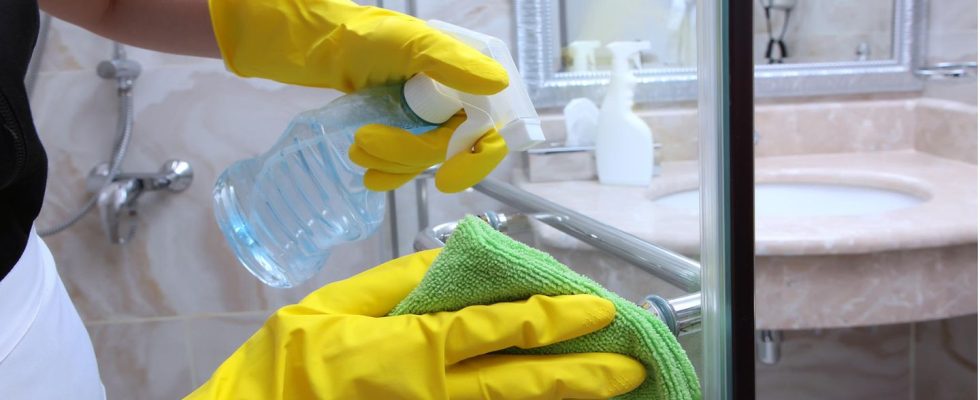Cleaning tips
Cleaning the shower: The best tricks and home remedies
If you clean your shower regularly, you will prevent limescale, dirt and mold
© AllaKostomarova / Getty Images
Limescale and dirt deposits are not a sign of poor hygiene, but rather the result of our daily personal hygiene in the bathroom. The high humidity and heat also provide an ideal breeding ground for mold.
The fittings, joints and tiles are particularly vulnerable, but the shower curtain or the shower cubicle walls also suffer from the constant watering of a wet room. And since limescale and dirt do not stop at glass or plastic, our tricks apply to all materials that are in your bathroom (in the shower). The following cleaning tips reveal which home remedies achieve the best results, even without aggressive cleaning agents.
1. Cleaning tip: joints
The best way to clean dirty joints is to use a mixture of baking soda (or Baking soda) and mix water. Apply the paste directly to the joints using a toothbrush and rub it into the affected areas. The mass must then be absorbed for a few minutes before you rinse it off again with warm water. But be careful: It is better not to clean limescale materials (e.g. marble or granite) with an acidic household product. Use a mixture here soda and water in a ratio of 3:1, which must be absorbed into the joints for 30 minutes.
A notice: You can read here how to get rid of mold in the bathroom.
2nd cleaning tip: tiles
Calcified tiles are much easier to clean. Here, too, you can mix a baking soda and water mixture until it forms a spreadable paste and apply it with an old sponge. Alternatively, you can also use a proven home remedy: Vinegar essence. Dilute this with water and then apply the liquid to the tiles with a cloth in circular movements. If possible, make sure not to rub the joints. Then rinse the solution off with warm water.
A notice: For stubborn deposits, it may be worth investing in one Steam cleaner worthwhile. By using hot steam, residual dirt can be easily removed from the tiles. The included attachments and brushes can be used to clean the joints.
3. Cleaning tip: drain
Hair and dirt, shampoo and shower gel residue can clog the drain in the shower. Instead of using an aggressive pipe cleaner, the problem can be solved differently – for example with a vinegar and soda mixture: First drizzle five tablespoons soda into the sink and pour a coffee cup of vinegar after it. If the mixture starts to foam, let it work for a few minutes before rinsing the drain with hot water. Important: The resulting fumes can irritate the respiratory tract, so it is better to wear a face mask and ventilate the bathroom well.
4. Cleaning tip: fittings
A home remedy has also proven useful here: citric acid (alternatively, vinegar works). Dilute this with a little water before using it to clean your shower fittings. If the deposits are particularly stubborn, you can leave the mixture to work overnight and wipe it off the next day.
A notice: Read here how you can descale a faucet.
5. Cleaning tip: shower curtain
In contrast to a shower cubicle, most shower curtains have the great advantage that they can be cleaned in the washing machine. You can see whether this is really the case from the sewn-in label – it also states the maximum number of degrees that the material can withstand without any problems. But even at 30 degrees, most models become very clean again.
6. Cleaning tip: Glass shower cubicle
If a shower cubicle is made of glass, you can remove limescale and dirt deposits using the following home remedies:
- Mix vinegar with water in a 1:2 ratio. Treat the glass with the mixture as thoroughly as possible and then rinse it again with cold water.
- Use the juice of a real lemon (one shot is enough) and mix it with water. Use it to clean the glass as described above.
7. Cleaning tip: Plastic shower cubicle
However, if you have a plastic shower cubicle, you can use the following home remedies and tricks:
- Use so-called soft soapto remove limescale deposits. Rub this into the shower cubicle with a damp cloth, let it take effect briefly and rinse it off again.
- For stubborn stains, the only solution is usually a commercially available plastic cleaner or a Shower cubicle cleaner.
- Important: Do not use baking soda as it can attack the plastic and damage it.
Extra tip: Do you already know this trick? Take half a (raw) potato slice and rub it into the shower cubicle – this creates a kind of lotus effect, i.e. the water rolls off the shower walls and leaves less residue on them.
8. Cleaning tip: Preventive measures
Last but not least, you can prevent limescale and dirt deposits in advance by cleaning your bathroom regularly. Also, always use one after showering Rubber pullerto remove water from the walls. You can also dry the fittings with a towel if they become damp.
You might also be interested in:
This article contains so-called affiliate links. Further information are available here.


